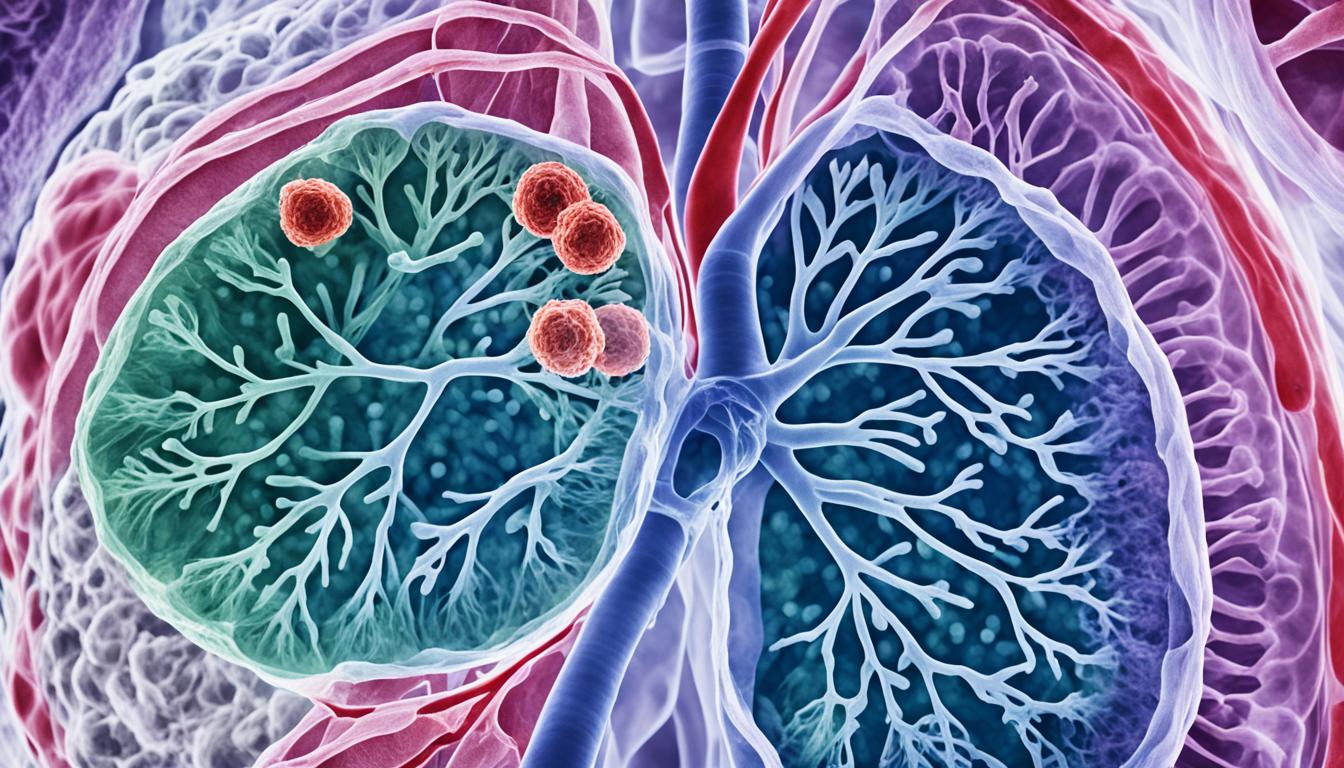Fibrosis cystic, or cystic fibrosis, is a disease mostly affecting the lungs and digestive system. It’s caused by a gene mutation called CFTR. This mutation affects the body, making it hard for the person to breathe and digest food properly.
People with fibrosis cystic have several symptoms that change their day-to-day life. These include a constant cough, getting frequent lung infections, and breathing problems. Some also don’t grow as they should. The symptoms can be different for each person. So, getting the right diagnosis is important for proper care.
Doctors diagnose fibrosis cystic by looking at genes and doing health checks. Genetic tests find out if the CFTR gene has mutations. Health checks help see how the lungs work and the person’s overall health. Finding the disease early and treating it soon is crucial for a better life.
While there’s no cure for this disease, doctors can help manage the symptoms. They use antibiotics to fight off and prevent lung infections. Physiotherapy can make it easier to breathe by clearing up the airways. Also, there are medicines that can widen the air passages, reducing breathing problems.
Key Takeaways:
- Fibrosis cystic, also known as cystic fibrosis, is a genetic condition affecting the lungs and digestive system.
- Symptoms of fibrosis cystic include persistent cough, frequent lung infections, difficulty breathing, and poor growth.
- Diagnosis involves genetic testing to detect CFTR gene mutations and clinical evaluations to evaluate symptoms and overall health.
- Current treatments focus on managing symptoms and improving quality of life, including antibiotics for infections, physiotherapy to clear the airways, and medications to expand the airways.
- Stem cell therapy shows promise as an innovative treatment approach for restoring lung function in individuals with fibrosis cystic.
Genetic Causes and Diagnosis of Cystic Fibrosis
Cystic fibrosis is caused by changes in the CFTR gene. This gene controls how salt and fluids move in the body. When it’s not working right, symptoms of cystic fibrosis appear.
If both parents carry a faulty CFTR gene, their child could get cystic fibrosis. Carriers themselves usually feel fine. But, with genetic testing, we can find out who might pass it to their kids.
Doctors use many tests to diagnose cystic fibrosis. One key test is genetic testing. It looks for specific CFTR gene problems, confirming if cystic fibrosis is present.
Sweat tests are also done. People with cystic fibrosis have more salt in their sweat. This high salt level is a big clue for doctors.
Other tests check how the lungs are working. This includes breathing and X-ray tests. Blood tests can show if there’s an infection or check the body’s health.
Diagnosing cystic fibrosis early is vital. It helps start treatments that can make life better. With genetic tests and signs like high salt in sweat, doctors can help manage the disease better.
| Genetic Causes and Diagnosis of Cystic Fibrosis | |
|---|---|
| Genetic Causes | Diagnosis |
| Mutations in the CFTR gene | Genetic testing |
| Both parents must be carriers | Sweat tests |
| Lung function tests | |
| Chest X-rays | |
| Blood tests |
Advances in Stem Cell Therapy for Cystic Fibrosis
Scientists are looking into stem cell therapy as a new treatment for cystic fibrosis. They are finding that cord blood stem cells could help fix lung issues.
Studies show that umbilical cord blood has many stem cells. These cells might help repair lung tissue in cystic fibrosis patients.
There’s also excitement about using patients’ own cells to make stem cells. Scientists can change these cells to fix the CFTR gene and turn them into lung cells. The plan is to put these new cells into damaged lungs to help them work normally again.
Although using stem cells to treat cystic fibrosis is still in the early phase, it shows a lot of promise. There is hope that ongoing research in this area will lead to better treatment options.

